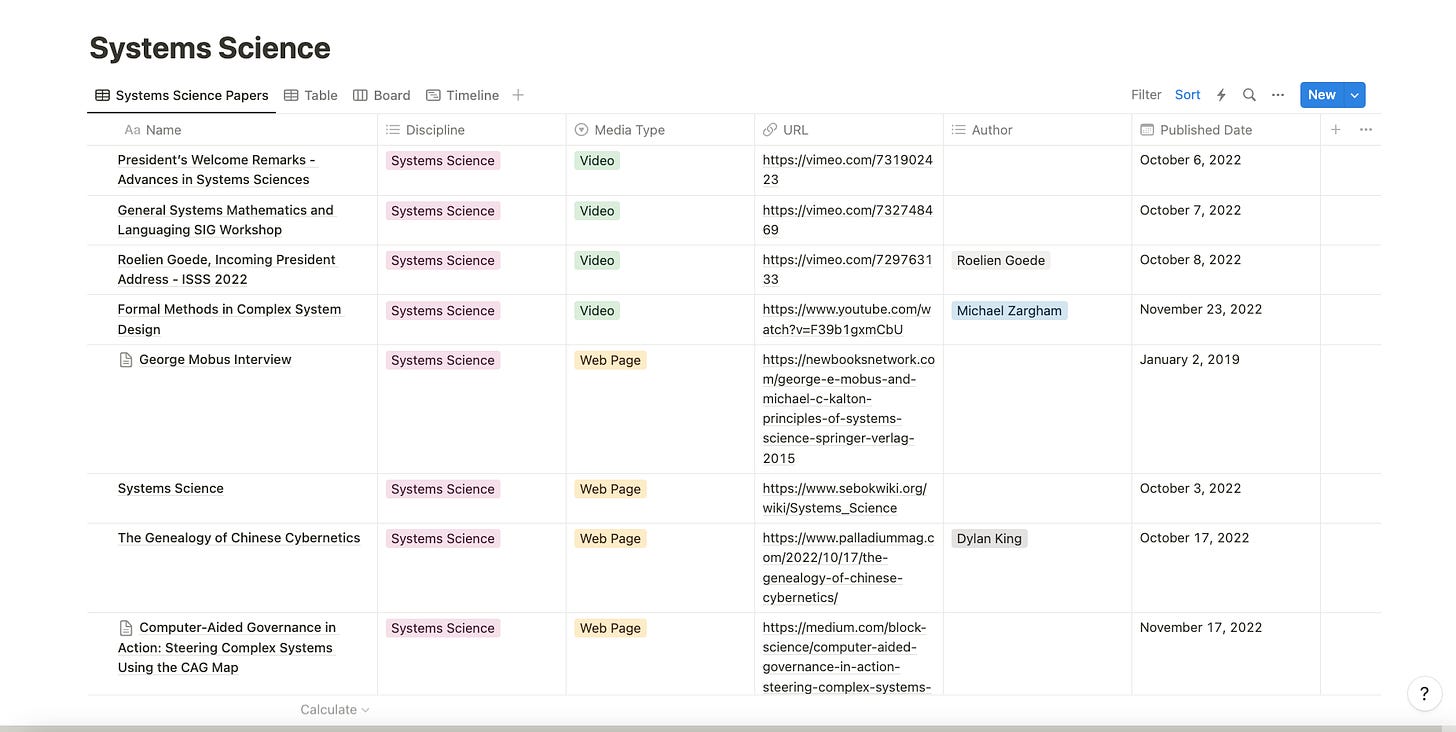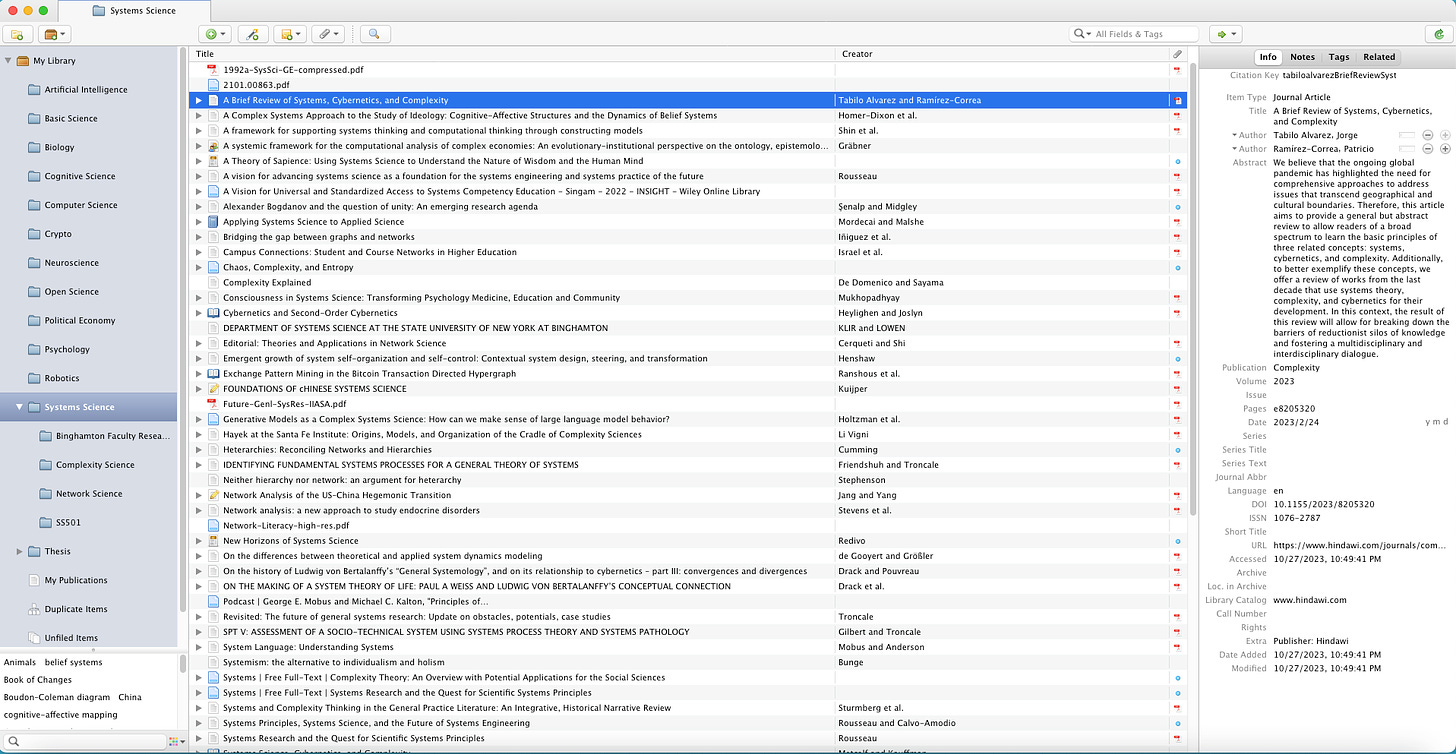Organization is one of the most important concepts in systems science.
It’s also a topic that I’ve been focusing on in the context of my personal life. I’ve never been a highly organized person, and it’s becoming clear that this trait is a major constraint on my productivity and overall happiness.
For example, in my Introduction to Systems Science course, I’ve found that decoding complex simulations and carefully analyzing academic research that I’ve been assigned to present on comes fairly naturally to me. What I’m struggling with is the relatively simple task of reading the rest of the course readings on a regular basis and making simple contributions to discussions online.
This isn’t because the content is too difficult or because I lack the time. It’s because I don’t have systems in place to help me manage my time and organize the content I’m reading in a way that facilitates easy retrieval and sharing of key insights.
Organization and Complex Systems
One of our early readings was Warren Weaver’s Science and Complexity. Writing in 1948, Weaver argued that the great challenge for science in the 20th century was to figure out how to deal with problems showing “the essential feature of organization.” This was defined as any problem which involved “dealing simultaneously with a sizable number of factors which are interrelated into an organic whole.”
More recently we read Ross Ashby’s Principles of the Self-Organizing System. Ashby argues that organization is present in a system “As soon as the relation between two entities A and B becomes conditional on C’s value or state.” Ashby believed that organization was the fundamental concept lying at the heart of work being done in cybernetics.
In Principles of Systems Science, George Mobus proposes a principle that systems are processes organized as hierarchies.
To make sense of any complex system, we must be concerned with how it is organized. Detailed understanding of the individual components in isolation is insufficient.
Research Collections as Complex Systems
One complex system that I interact with on a regular basis is my set of research collections on subjects I’m interested in: systems science, political economy, personality psychology, neuroscience, etc. A research collection can be defined as a set of material resources which “aim at achieving complete coverage of a subject.”
My nascent research collection on systems science can be usefully described as a complex system.
There are a sizeable number of factors (68 papers) interrelated into an organic whole
The relation between any two entities (papers) is partly conditional on the state of the database being used to hold them
The collection is an ongoing process of adding, removing, and sorting papers that are organized as a hierarchy of papers, folders, and subfolders
Towards Greater Organization
I don’t collect research papers about systems science so that the papers can sit around as unused artifacts. My long-term objective is to absorb and synthesize as much information as possible about the discipline’s history and current state so that I can start making meaningful contributions to the field.
My old “system” of links haphazardly stored in an unmaintained Notion database, random folders on my laptop, and bookmark folders in my web browser did not support me in achieving this goal.
So I’ve been building a new system.
I’ve been migrating all of my research papers into Zotero, “a free, easy-to-use tool to help you collect, organize, annotate, cite, and share research.” All PDFs, URLs, and notes are being collected into a centralized location. My papers are being organized in a way that facilitates more effective learning, synthesis, and creation.
It may seem a bit silly that simply shifting to a different form of database would have a meaningful impact, but I’m already starting to feel the benefits.
I used to spend time generating bibliographies for research papers manually. Now they can be created instantly with a click. I’m being reminded of old ideas for content I wanted to create, and getting inspiration for a few new ones. I feel a greater sense of awareness about how all of the research I’ve collected can start to form a coherent whole. The next step in this organizational process is for me is to put all of the papers from my class into their own subfolder.
This is just one illustrative example of how my life is being improved by shifting more of my attention towards organization. I appreciate being able to make some direct connections between philosophical concepts from the classroom and practical issues I face on a day-to-day basis.





